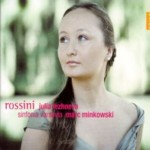Julia Lezhneva, a protégé of Kiri Te Kanawa, is a 21(!)-year-old Russian soprano with a pretty, round face, who made her professional debut at 16. Nowadays this is unheard of–Cecilia Bartoli’s debut was at 21, and that seemed shocking–but if you travel back to the early and mid 19th century, this sort of precocity was prevalent: Isabella Colbran was 16 when she made her concert debut and 20 when she made her stage debut; Maria Malibran was 17 and Giuditta Pasta was 19. Of course, there’s more: Colbran’s voice apparently was unreliable from the time she was 25, Malibran died at 28 (so we’ll never know), and Pasta was praised more for her acting than her singing by the time she was 35. All three were known for the interesting colorings of their voices, their impressive upper extensions (to E above the staff), and for their expressive singing. (Late in Pasta’s career, her voice was described thusly: “It is a ruin, but then so is Leonardo’s Last Supper”.)
Lezhneva is lovely; let’s hope she paces herself properly. The voice may truly be a light mezzo (à la Frederica von Stade) rather than soprano; time will tell. The notes above A-natural are there, but they can go sour. At the moment–and on this recital–she tackles both mezzo and soprano roles (although there was little distinction in Rossini’s day, and all three singers mentioned above seem to have straddled the fence as well) and there are moments of transcendent beauty. Although her fast singing is terrific–you wouldn’t want more from Cenerentola or Elena (in Donna del lago)–the slow arias, from Tell, Corinto, and particularly Otello, are the real gems on this recording. In the fast music Lezhneva sounds happy and comfortable, but in the slow arias there’s more of a sense of drama and purpose–her rubato, legato, and sense of line and dynamics are gripping. She sings Pamina’s recit before “L’ora fatal s’apressa” like a mature artist rather than as a well-trained young songbird.
Marc Minkowski leads the Warsaw forces with energy and affection, and he entirely avoids any of the rum-tum-tumness that lesser conductors fall into. The band plays the Cenerentola overture with great spirit. The classy production includes chorus where there should be, and the accompanying booklet has notes and texts and translations. Let us hear more of her: when she’s good she’s gorgeous.
































